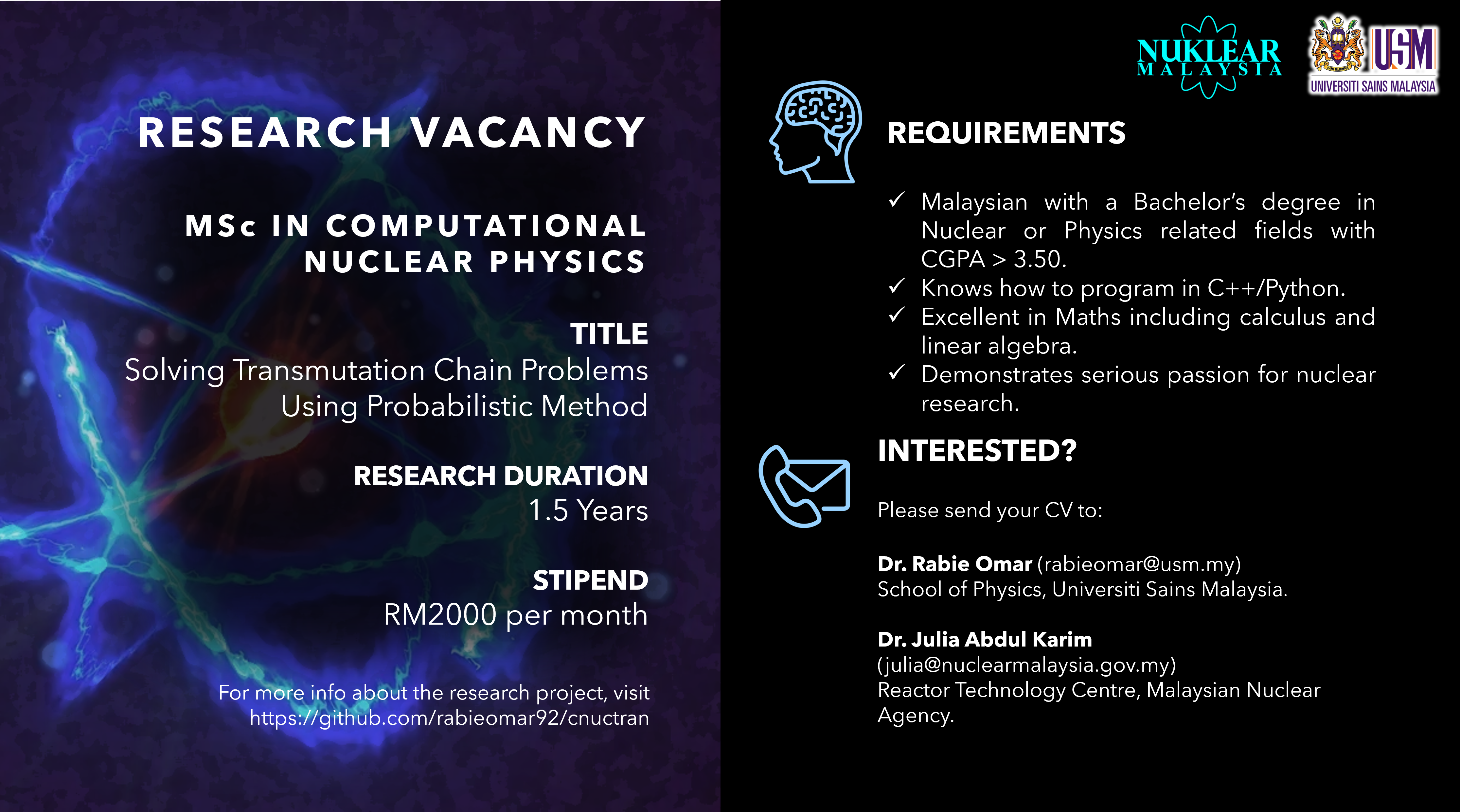Muhammad Rabie Omar
| Muhammad Rabie Omar (M. R. Omar) | ||
| Ext :3654 | ||
Omar has an MSc in Physics and Technology of Nuclear Reactors from the University of Birmingham, England; and a PhD in Computational Physics from the Universiti Sains Malaysia. Research interests: Development of a high-fidelity benchmark code for burnup calculations. We want to estimate the remaining nuclides concentration after a certain period of time. The idea is very similar to the traditional exponential nuclear decay equation. In reality, transmutation chains are very complicated and consist of many possible branches. Therefore, a more sophisticated solution, rather than the naive exponential decay equation is required. Several existing methods, such as Chebychev Rational Approximation depends on mathematical approximations and abstraction. These methods have been verified with high-precision mathematical methods, which are still dubious, and the benchmark solution is not exact. Thus, we aim to compute a high-fidelity code that simulates the actual nuclear transmutation. This simulation can be a bit computationally expensive. However, the code is parallelized, and its computational time is not an issue anymore. The proposed method/code is still under test, and we need your help to verify several of its properties, accuracy and limitations. Code repository for this project: rabieomar92/cnuctran: A Probabilistic C++ Solver for Nuclear Transmutation Problems. (github.com) Improvement of the Monte Carlo criticality calculation (On going). In this topic, researchers are trying to discover the various novel algorithms to improve the current state-of-the-art Monte Carlo criticality calculation. Here, criticality calculation helps nuclear engineers to assess the stability of various fissile nuclear technologies. An unstable fissile system may cause nuclear accidents that endanger life and increase the risk of exposure to fatal radiations. Briefly, criticality calculation involves the simulation of billions of neutrons. Each of these neutrons are tracked and traced from their birth due to a fission reaction until their death. This requires the heavy use of computational power to execute a massive amount of stochastic sampling using random numbers. Most of the time, this research requires a group of computational physicists that are able to write C++, Fortran and Python codes. Keywords: Criticality Calculation, k-Eigenvalue, Monte Carlo method, Boltzmann Transport, Reactor Physics, Reactor Safety, MCNP, OpenMC, TRIMON, TRIGLAV, Neutron Physics, FORTRAN, Python, C++. Current Project: Development of a high-fidelity reference burnup code via faithful simulation of transmutation events. (Graduate Research Assistant position is still available, RM2000/month) The probability distribution of transmutation events and its application for solving burnup problems. Current Project: Criticality calculation convergence. Fission source stationarity diagnostics using the Fourier fundamental mode coefficient Past Project: Reactor Physics (ended). I am currently looking for a dedicated Master/PhD student who is willing to work in the Nuclear Computational Physics research area. CGPA > 3.50 (or equivalent) and good in most physics & mathematical subjects. Potential novel projects to work on: • Incorporating machine-learning technique to Monte Carlo tallies for neutron transport (Kriging technique). [Skills required: Python (intermediate), C++ (basic level)] All the while I have been focusing on fission source convergence issues because false source convergence leads to erroneous criticality calculation. Such an erroneous calculation lead to nuclear design errors (leads to flaws in reactor design, nuclear fuel design, nuclear shielding design etc.). For more info on nuclear criticality safety: https://en.wikipedia.org/wiki/Nuclear_criticality_safety. I am also welcoming new novel ideas from you. Please share so that we can work together.
Profile
M.R. Omar is a young researcher working in the nuclear computational physics field. The general theme of his research works is on the safety protection for various nuclear technologies including nuclear fuel storage, nuclear reactors, etc. To date, his research focuses on (1) the core of the Monte Carlo method for neutron transport; and, (2) nuclear transmutation analysis and burnup calculations.
Research

MR Omar, JA Karim - Progress in Nuclear Energy
MR Omar, JA Karim - Progress in Nuclear EnergyTeaching
Omar is currently teaching ZCE111 Computational Approach for Physics Learning where this course focuses on nurturing new computational physics talents. In this course, the student will learn the basic of Python language and various fundamental numerical techniques.Supervision

For CGPA >3.40, the candidate must at least achieved an A- in Calculus, Complex Analysis, Linear Algebra, Statistics, Mathematical Methods.
Must know how to program using Python and C++. A knowledge in computer science is also appreciated.
• Speeding up fission source convergence in nuclear k-eigenvalue problems. (Hard to solve, a lingering problem since the 1960s). [Skills required: C++ (intermediate level)]
• Proposing a new fission source convergence indicator: able to detect neutron clustering, able to detect false convergence. [Skills required: C++ (intermediate level)]
• Proposing a new statistical/mathematical technique to decide the instance of fission source convergence. [Skills required: C++ (basic level), Python (intermediate level)]
• Further assessing the pros and cons of my proposed convergence indicator: The Fourier Fundamental Mode indicator. [Skills required: C++ (basic level), Python (intermediate level)]
- Hits: 3134